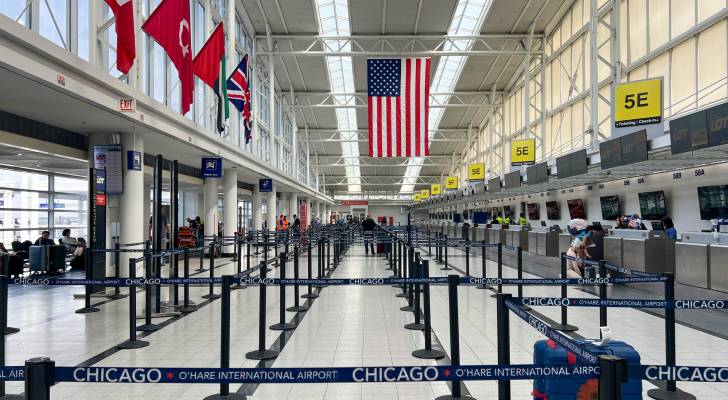Many Canadians have decided not to travel in the U.S. as a trade war continues.
Forward bookings for flights between Canada and the U.S. in coming months have plunged by as much as 75% compared with the same period in 2024, according to OAG, a global travel data provider.
In February, the number of Canadians crossing the land border into the U.S. dropped almost 500,000 compared to the same period last year, according to data from U.S. Customs and Border Protection (CBP) — reaching levels not seen since the height of the Covid-19 border closures.
“This is like Covid all over again,” said Len Saunders, an immigration lawyer in Blaine, Wash., which borders the Canadian province of British Columbia, in an interview with CBC News. “With the rhetoric coming from Trump — people just don’t want to come down here.”
The number of Canadian residents returning from the U.S. by flights also fell by 13.1% in February, with Air Canada, WestJet and United Airlines announcing cuts to service due to declining demand.
“A 10% reduction in Canadian travel could mean 2.0 million fewer visits, $2.1 billion in lost spending and 14,000 job losses,” according to the U.S. Travel Association, which noted that Canada is the top source of international visitors to the country, with 20.4 million visits in 2024.
But it’s not just Canada. The Trump administration is also escalating a trade war with Mexico, China and the European Union, and domestic tourism has also slowed down this year, with Bank of America aggregated card data showing softer lodging, tourism and airline spending. “It could be that the recent drop in consumer confidence is translating into people hesitating to book trips, or considering paring them back. But bad weather and a late Easter this year are also likely playing a part,” said the bank.
While this will undoubtedly impact Americans working in the tourism and hospitality industry, it could also have impacts on everyday Americans.
It’s not just tariffs that have shaken Canada-U.S. relations. Taunts about Canada becoming the 51st state, threats of annexation and reports of Canadians and other nationals being detained by Immigration and Customs Enforcement (ICE) — like the account of one Vancouver woman detained by ICE for two weeks — is keeping Canadians away.
Then there’s the Canada-U.S. exchange rate. The loonie — which plummeted to its lowest level in more than 20 years when Trump first announced impending tariffs — has since made modest gains. But that could be a good thing for American travelers.
But Barbara Barrett, executive director of the Frontier Duty Free Association, told CBC News that cross-border traffic declines aren’t due to the exchange rate. Rather, it’s about anti-tariff sentiment.
“We’ve seen the dollar fluctuate up and down before and we haven’t seen this sort of dramatic decline,” she said. “If it was all about the dollar — we’d have a flood of Americans coming over and we’re not seeing that.”
While many Canadians and other foreign nationals are boycotting the U.S., some don’t feel it’s safe to go right now. Several countries — including the U.K., Denmark, Finland, Germany and Canada — have updated their travel advisories for the U.S. regarding immigration requirements and gender identification.
“Since the start of the second Trump administration, there appears to be an uptick in foreign visitors to the U.S. being denied entry, resulting in people being sent back to their original destinations or being held in detention,” according to Wired.
As of April 11, Canadians will also have to register with the U.S. government if they plan to stay in the country for more than 30 days.
Read more: Are you rich enough to join the top 1%? Here’s the net worth you need to rank among America’s wealthiest — plus 2 ways to build that first-class portfolio
While tariffs may not have an immediate impact on domestic travel — like the price of airfare or hotel rooms — ongoing trade wars with multiple countries could eventually take a toll.
The Federal Reserve lowered its outlook for economic growth in 2025 to 1.7%, with inflation projected to creep up from 2.5% to 2.7%. With signs of slowing economic growth and consumer expectations for income, business, and labor market conditions at a 12-year low, Americans may decide to hold off on those vacation plans.
“The longer tariffs last, the more likely we’ll see air travel impacted in the form of higher costs for Boeing and airlines, fewer overall flights, and higher fares,” Scott Keyes, founder of Going, told USA Today.
But if the U.S. does sink into a recession, some travel costs could drop. “That’s because demand for travel typically falls during economic hard times, and with less demand, airlines would be forced to drop prices in order to fill planes,” Keyes said.
Americans traveling domestically may want to consider vacationing in areas impacted by a downturn in Canadian tourism, such as Florida. Prices could drop because of reduced demand; at the same time, you’d be helping to support the tourism industry in those areas.
Visits to national parks, however, could get more complicated. The mass firing of 1,000 national park workers could result in service delays and maintenance issues — so you’ll want to plan any outdoor adventures far in advance.
As gas prices rise as a result of tariffs, road trips could also get more expensive (at home and abroad). So, for example, if you’re traveling in Europe, you may want to compare the costs of traveling by train rather than renting a car.
If prices escalate, airlines and hotels may adjust their prices accordingly. So it may be better to book sooner rather than later to lock in rates for flights and hotels.
Another option is to cash in those frequent flyer miles or credit card travel rewards to save on flights, hotels and rental cars. If you’re in the market for a new travel rewards credit card, keep an eye out for promotional offers that could help fund your next vacation.
It could also be a good time to sit down with a financial adviser to come up with a game plan for uncertain times, which could mean diversifying your portfolio, topping up your emergency fund and perhaps even creating a “travel fund” (say, in a high-interest savings account) so you don’t rack up unnecessary credit card debt on your next vacation.
This article provides information only and should not be construed as advice. It is provided without warranty of any kind.


